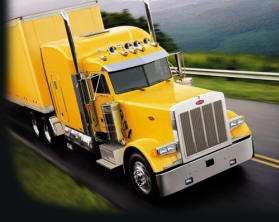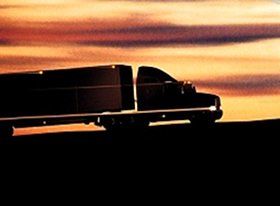Countless Hours Of Unpaid Work As A Company Driver. Trucking Truth
Topic 7554 | Page 1

Im all about the hard work pays off and you get what you put into something. The 1000 hours in one year of unpaid work doesn't sit right with me. That's called robbery.

One of the reasons OTR is considered a lifestyle occupation. You can't really compare it to an hourly job. Drivers call what you're referring to as free trucking.
Now local gigs might not require as much free trucking, especially if you're hourly. But generally speaking, there is almost always some free trucking going on, it's part of the job as a driver. You can accept it as part of the industry, or get bitter.
OTR:
Over The Road
OTR driving normally means you'll be hauling freight to various customers throughout your company's hauling region. It often entails being gone from home for two to three weeks at a time.

One of the reasons OTR is considered a lifestyle occupation. You can't really compare it to an hourly job. Drivers call what you're referring to as free trucking.
Now local gigs might not require as much free trucking, especially if you're hourly. But generally speaking, there is almost always some free trucking going on, it's part of the job as a driver. You can accept it as part of the industry, or get bitter.
This is very true 6 string! I spent hours yesterday trying to find a consignee and was finally told to take the load to our Gary terminal and someone would relay it Monday. I drove 100 miles I won't get paid for and burned 4 hours off of my clock so couldn't get to my next load yesterday. Consequently, I will not get home until late today and will leave the house again Monday morning after being out 12 days. It is what it is so the choice is to get ****ed about it or move on. I am moving on and will make the best of it!
Consignee:
The customer the freight is being delivered to. Also referred to as "the receiver". The shipper is the customer that is shipping the goods, the consignee is the customer receiving the goods.
Terminal:
A facility where trucking companies operate out of, or their "home base" if you will. A lot of major companies have multiple terminals around the country which usually consist of the main office building, a drop lot for trailers, and sometimes a repair shop and wash facilities.
OTR:
Over The Road
OTR driving normally means you'll be hauling freight to various customers throughout your company's hauling region. It often entails being gone from home for two to three weeks at a time.
The way I look at it is what difference does it may how they break down the pay if it ends up the same in the end? If you make $45,000 getting $5/hr or .35 cpm it makes no difference. You still made $45,000 that year.
Trucking has been around since wheels were round so I'm pretty sure companies understand there is a lot more to the job than turning miles. So think of it this way - the hourly stuff is already figured into your mileage pay. They know for every x number of miles you turn you'll put in x number of hours of "other stuff" beyond turning miles.
Here's another question for ya. What if you were putting in the same number of hours as other drivers but you worked harder and you were more efficient, they just wasted a bunch of time on the clock. Wouldn't you want to get paid for the work you get done, not the hours you put in?
It's not a perfect system and there is no perfect system. But the nice thing about it is that trucking companies and their drivers either make money together, or make nothing together, depending on whether or not those wheels are turning. So you both want to turn as many miles as possible. That's the scenario you want.
Look at it yearly. If it's worth spending a year on the road making whatever you're going to make this year then the job is worth it, regardless of how they break down the way you're paid.
Here's an interesting article about Why Drivers Are Paid By The Mile.
CPM:
Cents Per Mile
Drivers are often paid by the mile and it's given in cents per mile, or cpm.
HOS:
Hours Of Service
HOS refers to the logbook hours of service regulations.
I've had to wrap my mind around the 'working for free' thing as an Uber driver for the past 8 months. Sitting around, waiting for a ping to get a ride. Some days, nothing-others busy all day. Looking at it daily it's up and down but averaging it over the week or month, it's ok. Same thing when you work for tips. Making $2.75/hour when you have no tables is working for free. Then you get busy and make up for it.

Im all about the hard work pays off and you get what you put into something. The 1000 hours in one year of unpaid work doesn't sit right with me. That's called robbery.
Me thinks your math is off a little. Basically you are saying you are working 20 hours a week every week while on off duty status. What exactly are you doing during all this extra time you say you are working? Maybe we can help if we have more details? Maybe we need to have better communications with dispatch? Maybe it is a time management thing that can be fixed? Until we know specifics no one will be able to help.
Now the reason I came up with 20 hours per week is that working 40 hours per week is 2080 hours per year.

Just to elucidate a bit more on my trucking job, since I'm considered local and not OTR.
I'm linehaul , so I'm paid like an OTR driver by cpm. I'm not an hourly P&D (wonder if that's in your glossary yet Brett?) guy. I might have a gate time of 23:00, but I show up an hour to an hour and half early to pre-trip and leave time to find and hook up my double trailers. If I wouldn't show up early, I'd be late.
Also, I sometimes have to wait at a meet point for another driver, or sometimes freight might be late by an hour or more. I know, nothing like you OTR reefer guys gotta deal with, but it's still free trucking.
I don't get upset about it. Some guys do. I chalk it up as part of the job. I love my job and company, so I'm not complaining. Sometimes you gotta show up early to get the job done properly. And sometimes it doesn't matter if you were early because somebody else is gonna be late and you get slowed down regardless of your careful planning.
OTR:
Over The Road
OTR driving normally means you'll be hauling freight to various customers throughout your company's hauling region. It often entails being gone from home for two to three weeks at a time.
P&D:
Pickup & Delivery
Local drivers that stay around their area, usually within 100 mile radius of a terminal, picking up and delivering loads.
LTL (Less Than Truckload) carriers for instance will have Linehaul drivers and P&D drivers. The P&D drivers will deliver loads locally from the terminal and pick up loads returning to the terminal. Linehaul drivers will then run truckloads from terminal to terminal.
Linehaul:
Linehaul drivers will normally run loads from terminal to terminal for LTL (Less than Truckload) companies.
LTL (Less Than Truckload) carriers will have Linehaul drivers and P&D drivers. The P&D drivers will deliver loads locally from the terminal and pick up loads returning them to the terminal. Linehaul drivers will then run truckloads from terminal to terminal.CPM:
Cents Per Mile
Drivers are often paid by the mile and it's given in cents per mile, or cpm.
Reefer:
A refrigerated trailer.

WOW! P&D was in the glossary! Little bit of love for LTL after all. 
LTL:
Less Than Truckload
Refers to carriers that make a lot of smaller pickups and deliveries for multiple customers as opposed to hauling one big load of freight for one customer. This type of hauling is normally done by companies with terminals scattered throughout the country where freight is sorted before being moved on to its destination.
LTL carriers include:
- FedEx Freight
- Con-way
- YRC Freight
- UPS
- Old Dominion
- Estes
- Yellow-Roadway
- ABF Freight
- R+L Carrier
P&D:
Pickup & Delivery
Local drivers that stay around their area, usually within 100 mile radius of a terminal, picking up and delivering loads.
LTL (Less Than Truckload) carriers for instance will have Linehaul drivers and P&D drivers. The P&D drivers will deliver loads locally from the terminal and pick up loads returning to the terminal. Linehaul drivers will then run truckloads from terminal to terminal.
I've put in a lot of "free" work hours at other jobs. It's just part of the day. I always liked to be at work site, hour early to either see what's on the agenda and get my head into it. Rather than show up just in time to clock, in and get busy. Or have helped boss out after hours chasing equipment, at least get a free dinner. And usually got "paid" back in other ways down the road. But I'm just that way, I'll help out, than leave someone hanging. Used to tick off the ex, because, say dad calls me up to come over and help him with something, I'd drop what I was doing and go! Things "usually" wash out in the end
New Reply:
New! Check out our help videos for a better understanding of our forum features

















Preview:
This topic has the following tags:
Truck Driver Salary







 TT On Facebook
TT On Facebook
You work way more hours than a normal worker and all those off duty hours you are working to save clock because you only get paid for miles. Experienced truckers need to chime in on what move to make so im always getting paid. I like otr and the job but all this unpaid work is ridiculous.
OTR:
Over The Road
OTR driving normally means you'll be hauling freight to various customers throughout your company's hauling region. It often entails being gone from home for two to three weeks at a time.
HOS:
Hours Of Service
HOS refers to the logbook hours of service regulations.